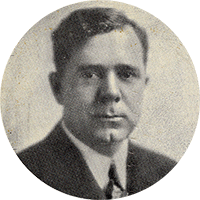In order to finance his building and social programs, Huey called a special session of the legislature to enact a 5 cent-per-barrel tax on the production of refined oil. The bill was met with a storm of opposition from the state’s big oil interests, and opponents in the legislature moved to impeach Huey on charges ranging from misuse of state funds to using “abusive language.”

Huey on the speaking circuit ~ Courtesy of LSU Libraries Special Collections.
Huey responded with a statewide campaign to make his case that Standard Oil and his political opponents were conspiring to retake state government using the trumped-up charges against him. He asserted that legislators had been offered as much as $25,000 for their votes to remove him from office — or enough money "to burn a wet mule".
Of the original 19 charges, eight items were passed in the House. When the trial moved to the Senate, Huey produced a document signed by over one third of the senators, stating they would vote against impeachment because the trial was illegal. With the two-thirds majority required to convict now impossible, Huey’s opponents halted the proceedings.
After the impeachment, Huey became determined to fight fire with fire when dealing with his enemies. “I used to try to get things done by saying please,” he later told reporters. “Now I dynamite them out of my path.”
With the state’s major newspapers financed by his opposition, in 1930 Huey founded his own newspaper, The Louisiana Progress, which he used to make the case for his programs and publicize his achievements. After impeachment, Huey received death threats. His New Orleans home was the target of a drive-by shooting and several arson attempts. Fearing for his life and the safety of his family, he began surrounding himself with armed bodyguards.




